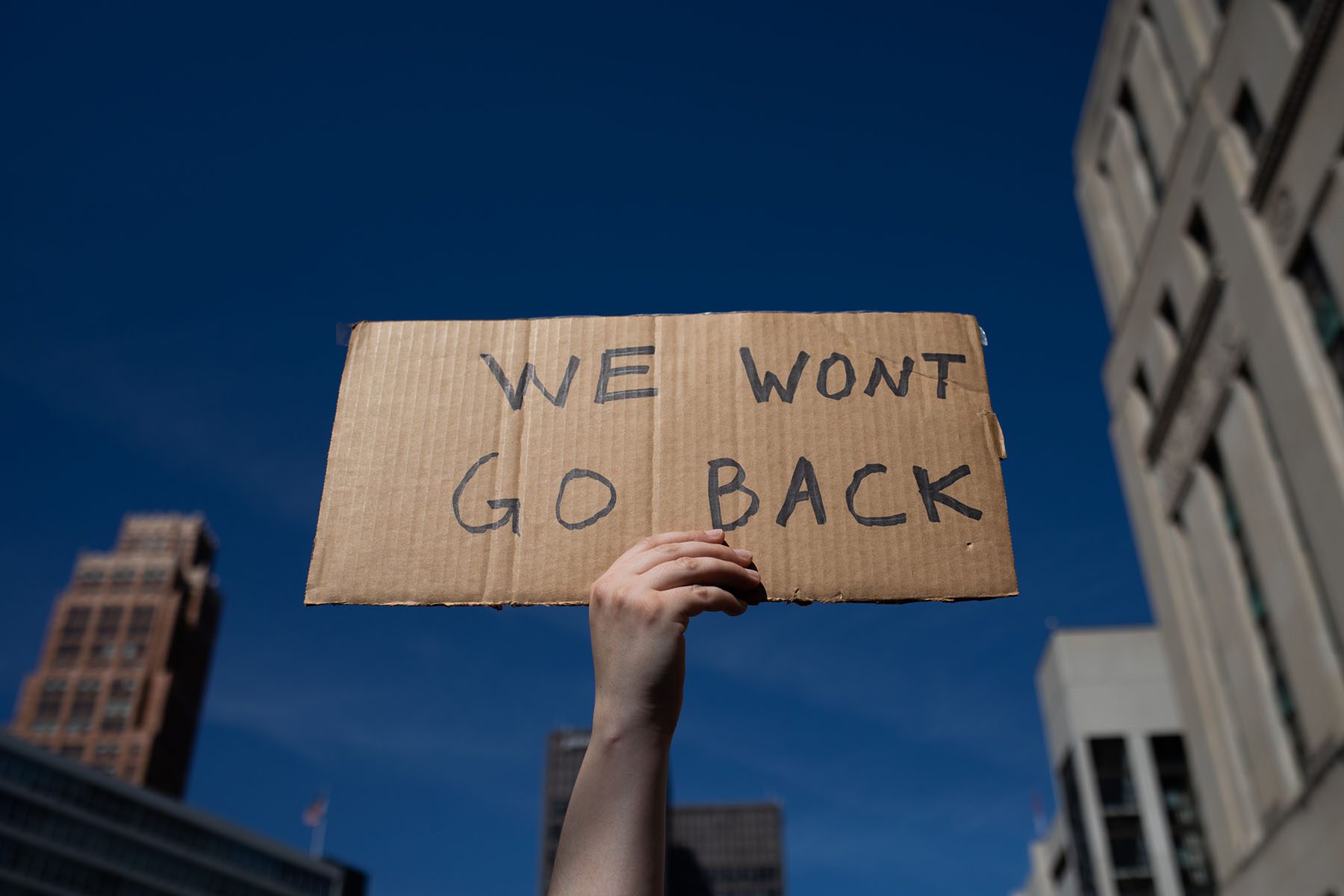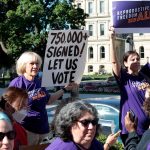LANSING, Michigan — Susan Anderson has always been a voter, but as the 47-year-old Michigan woman puts it, she has never been “overly involved in politics.” She donated to campaigns, but she wouldn’t volunteer or attend events.
But the Supreme Court’s summer ruling on abortion changed the calculus for Anderson. In particular, she remembers reading in May about the leaked draft of the ruling that eventually overturned Roe v. Wade, the landmark 1973 decision that protected federal abortion rights. She felt she had to do more than vote. This week, Anderson attended a rally near the Michigan Capitol, where organizers had gathered to spotlight efforts to add an amendment protecting abortion to the Michigan Constitution.
Over the summer, Anderson volunteered to collect signatures to get the question on the ballot in November. She said that while she had already planned to vote, she is also having conversations with her friends, neighbors and coworkers about whether they plan to vote, too. She may not have done that kind of personal outreach if the ballot measure wasn’t on the line.
“It’s about your own personal freedom to make choices,” she said about why the issue is so important to her. “I don’t think the government should get involved in that.”
With less than two months to go before the midterm elections, preliminary data from key battleground states indicates that abortion could be a salient topic for voters in November. Many Democrats have been highlighting abortion for weeks on the campaign trail and are hitting the airwaves with a message that they will protect abortion rights as they seek to keep control of Congress and flip statehouses where they’re out of power. Republicans have maintained that concerns about the economy will be the main motivation for voters.
Democrats point to indications that their side has gained strength since the Supreme Court’s June decision in Dobbs vs. Jackson Women’s Health Organization. In early August, Kansas voters turned out in record numbers to reject a ballot measure that would have allowed lawmakers to restrict abortion rights. After the June 24 decision over Roe, 70 percent of Kansas voters who registered to vote were women, according to an analysis from TargetSmart, a Democratic data firm. It’s not just Kansas. Additional analysis from TargetSmart shows rises in women registering in Wisconsin and Pennsylvania, as well as other swing states.
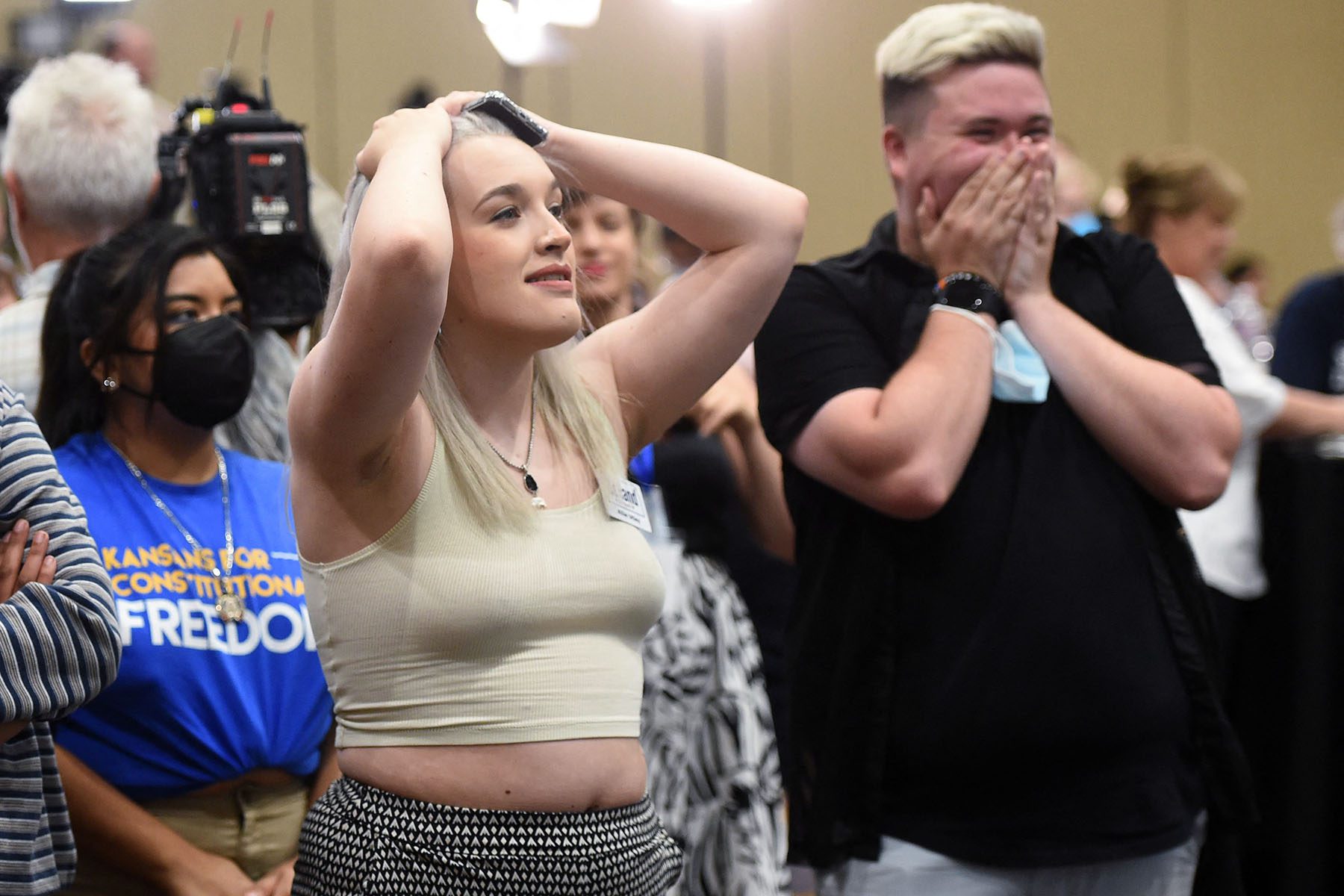
Polls and special elections are buoying Democratic hopes, too. August polling from the Kaiser Family Foundation also showed 6 in 10 women voters between the ages of 18 and 49 say they are “more motivated” to vote because of the Supreme Court ruling. And in an August special election for a New York congressional seat, the Democratic candidate credits his win to messaging around supporting abortion rights.
But Michigan may be a test case for how much abortion will weigh on voters’ decisions. A dormant 1931 law that bans most abortions was triggered after the Roe reversal, though it has not been in effect amid litigation challenges. (A court ruled the law unconstitutional on Wednesday).
The ballot measure — and the fact that the state supreme court on Thursday ruled it will be on the November 8 ballot — could also motivate voters given that an elections board initially deadlocked on whether it would even advance. Nicole Wells Stallworth, executive director of Planned Parenthood Advocates of Michigan, said she’s not surprised that abortion could be bringing people together as a voting issue.
-
Read Next:
“Voters don’t see this as a political issue,” she told The 19th. “They see this as an issue that would ensure their access to equal and fair treatment under the law for women and people who can become pregnant.”
Several Democratic candidates for statewide races are also highlighting abortion rights on the campaign trail messaging over abortion. That includes the Michigan governor’s race, where Democrat Gretchen Whitmer is seeking reelection and has emphasized support for abortion access. Republican Tudor Dixon has said she does not support abortion, including in cases of rape or incest. Polling by The Detroit News and WDIV-TV released this week shows that 34 percent of respondents said abortion and women’s rights would motivate them to vote. That ranked above issues including inflation and the cost of living (26 percent), education (10 percent) and the economy and jobs (8 percent). The same poll showed Whitmer with a 13-point lead over Dixon.
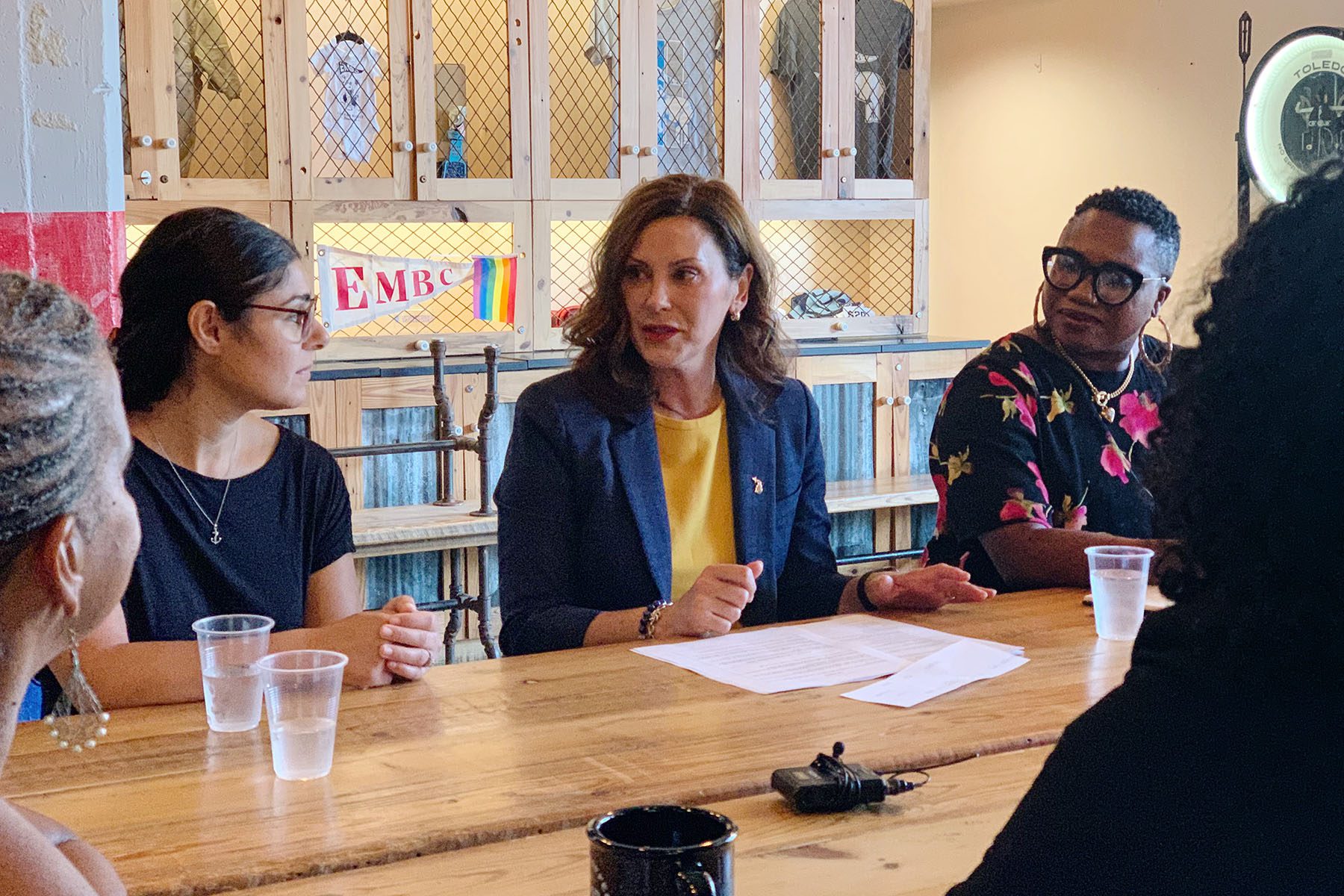
At a roundtable Thursday in Detroit, Whitmer appeared alongside health care workers to discuss abortion access. She told The 19th afterward that abortion has become such a defining issue in the campaign because of the stark contrast between her and Dixon. Dixon’s campaign did not respond to multiple requests for an interview.
“I’m running on the work that we’ve done around education and closing the skills gap and ensuring that people have clean drinking water and fixing the damn roads,” Whitmer said. “But I also want people to know that this is a human rights issue that is very much front and center and very much at risk.”
Laphonza Butler, president of Emily’s List, highlighted that some Republicans have scrubbed from their campaign websites references to strict anti-abortion stances as a sign of their fear over voter sentiment. Butler traveled around Michigan on Monday with Whitmer, visiting union workers who had gathered for Labor Day. Butler said people repeatedly thanked the governor for her work to protect abortion.
“It was a conversation that came in lots of different shapes and sizes, but it was always a conversation about the state of abortion rights in the country and specific to Michigan,” she said.
Michelle Peltier was at a Labor Day event hosted by IBEW Michigan, which represents electricians. She wore an American flag-themed T-shirt that read: “Mind Your Own Uterus.” Peltier, who identifies as a Democrat, said she plans to vote in November. The 55-year-old said she’s particularly anxious about abortion bans with no exceptions.
“Everything in life has exceptions,” she said.
While Democrats point to signs that the electorate is moving in their direction, it’s difficult to know how much abortion will motivate voters in an election that is still 60 days away. Initial voter registration data is not comprehensive, and it’s unclear how much voters who support abortion bans and restrictions will turn out themselves. The same Kaiser polling showed inflation and gas prices remained the top issues for potential voters. Most prognosticators still give Republicans better-than-even chances to flip the U.S. House amid low approval ratings for President Joe Biden — though Democrats’ chances seem to have improved in a number of statewide races.
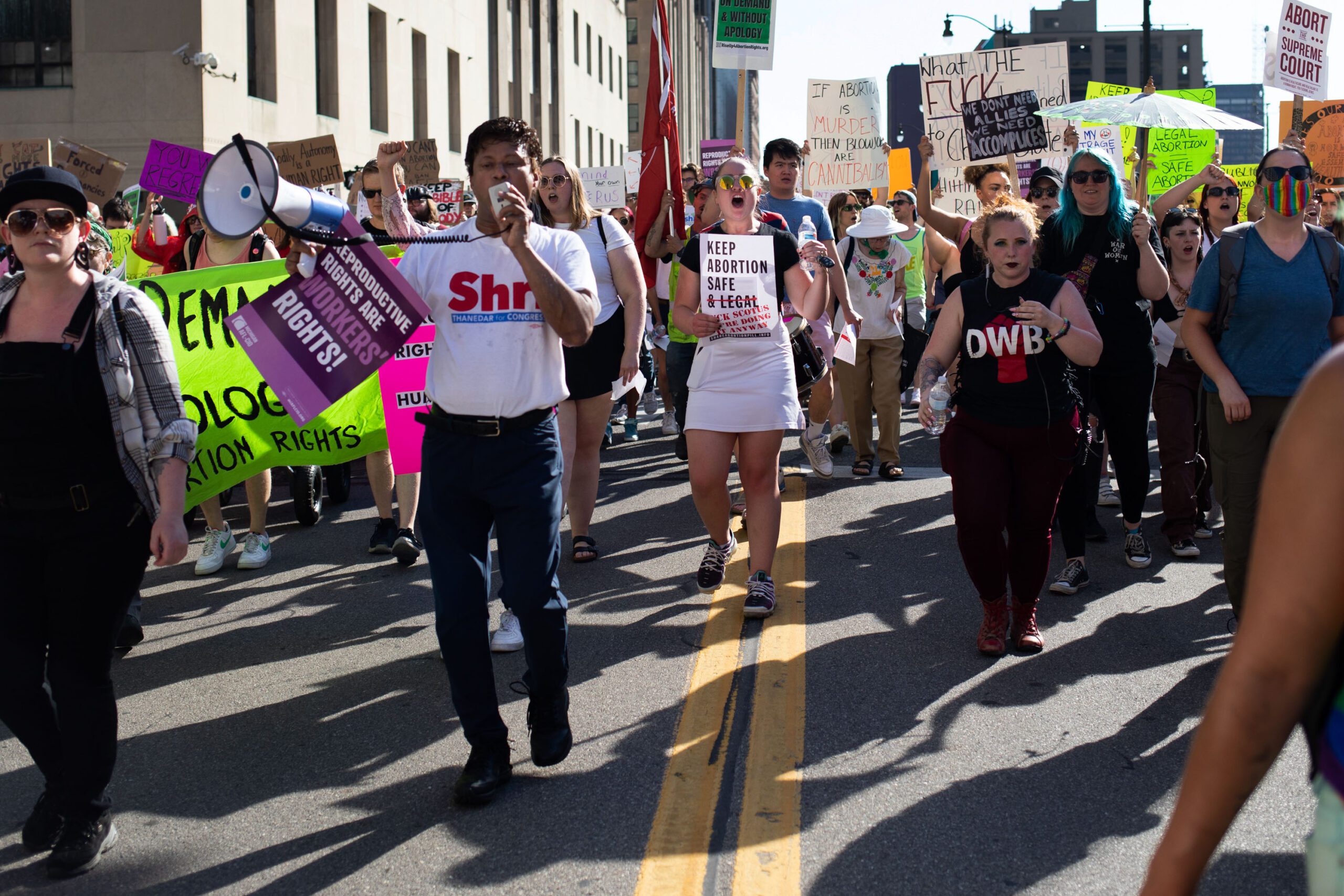
Then there’s the issue of voters who may be tuning out politics. In the Detroit suburb of Novi, where the Michigan State Fair was held over the weekend, some attendees who spoke to The 19th expressed surprise abortion was directly on the ballot this year. One woman said she hadn’t voted in about a decade and wasn’t sure if she would vote this year.
Whitmer acknowledges that some people may be tuned out because they’re trying to get back on track after several disruptions caused by the pandemic. She said she hopes to do more outreach in the weeks ahead. She has outraised Dixon by a large amount: As of late August, Whitmer had $14 million available to spend; Dixon had just about half a million dollars.
“I’m not going to assume that people have time and bandwidth to understand exactly what’s at risk here,” Whitmer said. “We’ve got to tell them, we’ve got to educate and we’ve got to persuade.”
